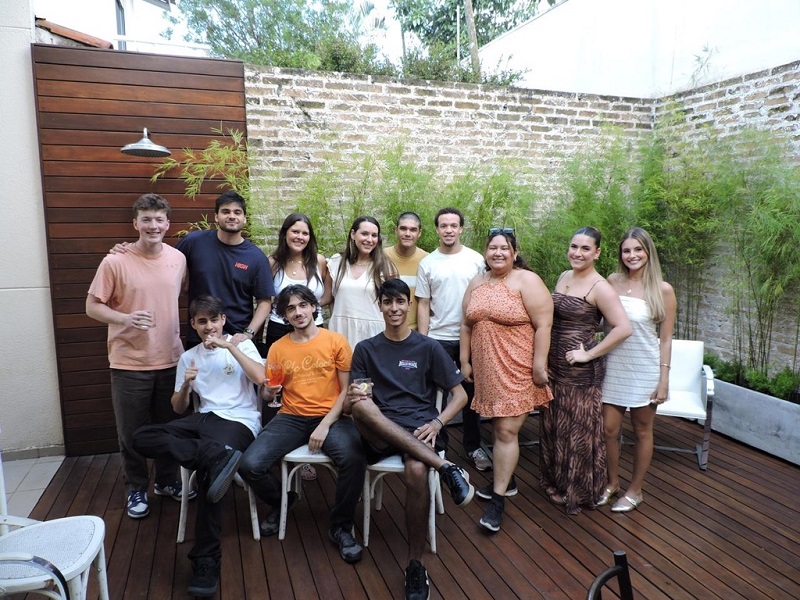Written by Ashton Brown, (Howard University), Student Correspondent for CET Brazil, (Business at FGV track), Spring 2025
One of the greatest ways to learn a language is to understand some of the common expressions used. While bom dia and legal are definitely the most commonly used, everyday phrases in Brazil, I want to highlight some longer sayings that, when they were pulled out, stuck with me. Sometimes they really fit a moment or a feeling, sometimes they just sound cool.

1. Quem quer, dá um jeito. Quem não quer, arruma uma desculpa.
He/she who wants to, will find a way. He/she who doesn’t want to, will find an excuse.
This is my favorite, and there’s a reason that it’s first. I heard this while overhearing two friends talking about one’s relationship. One friend was consoling the other, reminding the other that in a relationship, everyone has to give, and that when you only give excuses, it means something greater. I really enjoyed this phrase primarily because of the parallelism in the structure. It’s funny that it is similar to “if he/she wants to, he/she will.”
But it also strikes me as multipurpose: it’s for bad partners or bad friends; but it can also be used more internally. I am someone who personally struggles with saying “no” sometimes, and I often find it easier to soften the blow, by coming up with a polite excuse. This phrase has been helping me to remind myself that if I’m trying to find a reason to not do it, not wanting to do it can be reason enough. It also reminds me that if I really want to do something, the only thing I can do is find a way, and to never make an excuse for a controllable failure.
2. De graça, até injeção na testa.
For free, even to have an injection in the forehead.

For this phrase, like most of the phrases in this list, I can give the credit to my Brazilian roommate, Sabrina. Her advising has helped to explain many a situation and I’m deeply grateful for her. This phrase applies so well to me…who doesn’t like free stuff?! A meal, merchandise, a ride, anything!
This phrase applies literally to someone that is so keen to accept free things that they would allow an injection into their forehead. It casually represents loving free things to the point that it might hurt or inconvenience you. I’m not afraid to wait awhile for a discount or go further for the free meal. This can get tricky sometimes when I let my turn to buy the Uber for me and my roommates lapse a few too many times.
3. Quer ensinar o padre a rezar a missa?
You want to teach the priest how to pray the mass?

One day, my roommates and I were cleaning the apartment. We have the tradition of cleaning on Sundays at the same time. I was idly sweeping and chatting when my roommate Quinn goes, “Ashton, you know you can sweep the dirt into piles, rather than sweep it into the dustpan every time? It’s better that way.” I looked at him stunned. Myself, the boy with drastically detail-oriented, neat freak parents, who’s been cleaning almost as early as he could make a mess, was being told how to sweep.
This was the perfect instance to ask him, “Quer ensinar o padre a rezar a missa?!” and it was perfect. This is the longer, more descriptive way of saying “No duh!” to someone that tells you something obvious, or that you would clearly already know. I shouldn’t have to explain why you wouldn’t have to teach an ordained priest how to pray for a classic Sunday mass—unless I wanted you to use the phrase on me!
4. A quem madruge Deus ajuda.
God helps those that wake up early.

This is another one of my favorites that I actually learned in Espanhol before I learned in Portugues. This phrase is the more poetic way of saying “the early bird gets the worm”, and I prefer it because waking up to eat a worm doesn’t excite me quite as much as some supernatural assistance. You don’t have to be religious to use this term, but as someone with faith, I’m familiar with the sensation that in the morning it’s easier to feel connected spiritually with whatever you believe in. I like to wake up and engineer my mornings: I control what distractions I allow, what noise I intake, what movements I make (get up and stretch or roll over for 5 more minutes of cherished slumber). Don’t forget breakfast. I’m the kind of person that feels the day is wasted if I sleep through it, so this phrase resonates deeply with me.
5. Cutucar a onça com vara curta.
To prod the jaguar with a short stick.

We all do things we shouldn’t do sometimes, and we often don’t like the consequences even when they’re deserved. We’ve all fallen guilty to poking the jaguar with a stick short enough to get us eaten, but we do it anyway because sometimes it feels good to get away with something we know we shouldn’t. The problem comes when we think we’re invincible to those consequences. That’s when the jaguar strikes.
I love this phrase because of its relatability and its use of Brazil’s national animal. This is too true and something I would hear my mom say in he own version, right before saying “I told you so!” when it eventually catches up to me. While I know this should deter me from doing questionable things, I sometimes remind myself is that if you don’t poke the jaguar, you might never see the beauty of its roar!